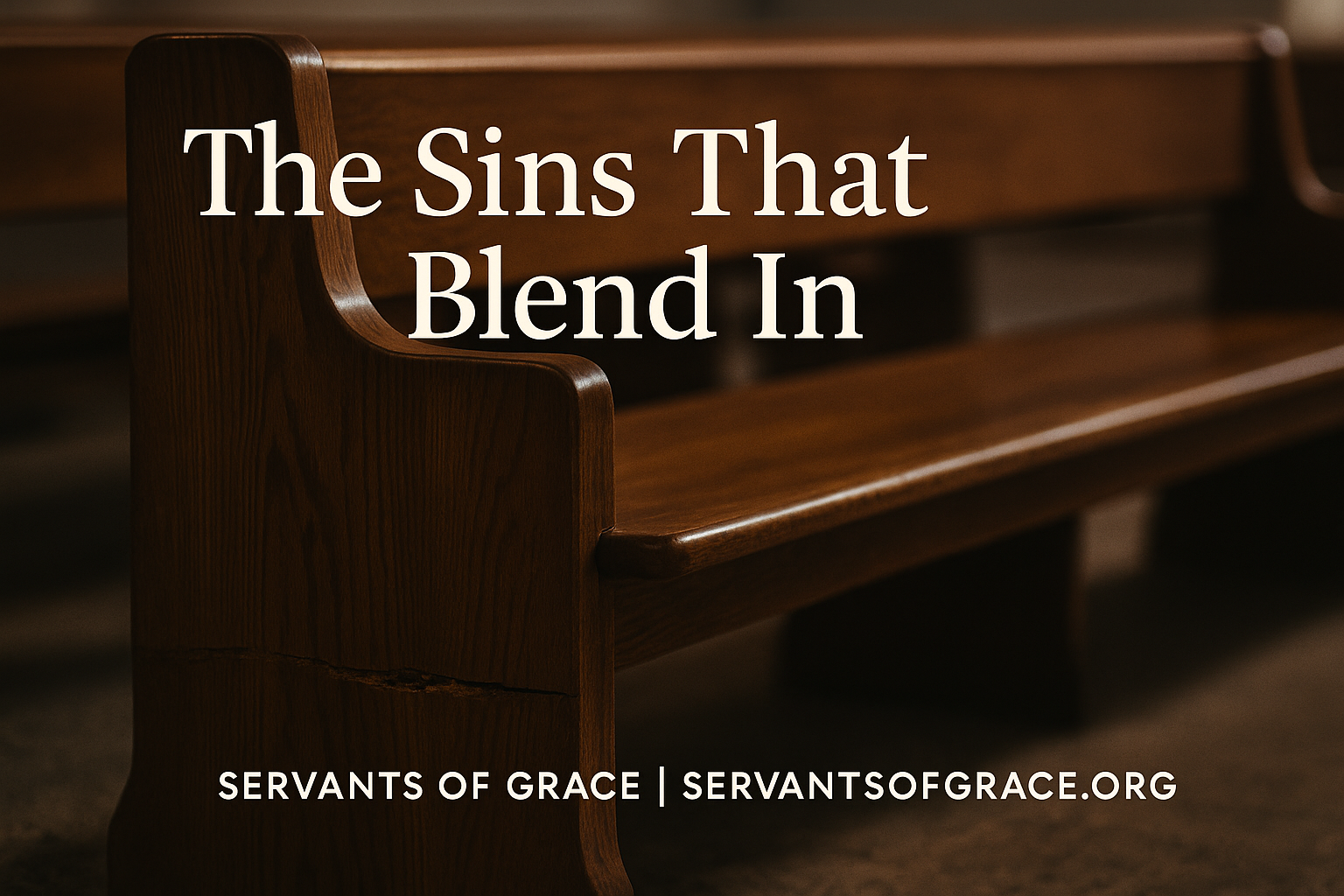⏱️ Estimated Reading Time: 6 min read
The Sins That Blend In: Confronting the Respectable Sins of the Church
By Drew Von Neida
“Search me, O God, and know my heart! Try me and know my thoughts! And see if there be any grievous way in me, and lead me in the way everlasting.”
— Psalm 139:23–24
There are sins the church still knows how to blush at: adultery, theft, drunkenness, open rebellion. But there are others, quieter ones, that have learned how to dress for Sunday. They sit in the pews, shake hands at the door, and bow their heads in prayer. Sins so socially acceptable that they can exist for years in a heart without ever being named.
They are not celebrated because they are righteous, but because they are common. They pass for maturity, personality, even prudence. But under the surface, they are corroding the soul and grieving the Spirit.
We rightly despise the obvious sins of the world while secretly harboring the subtle sins of the church.
When Sin Wears Sunday Clothes
Some sins destroy a church from the outside; these destroy it from within. They’re not scandalous—they’re respectable. They rarely make the headlines, but they are the termites of holiness.
They go by other names now:
- Pride is called conviction.
- Gossip is called concern.
- Fear is called wisdom.
- Envy is called ambition.
- Bitterness is called discernment.
We’ve learned how to sanctify our flesh and polish the outside of the cup while quietly feeding the mold within.
The Sin of Sanctified Pride
The Pharisee’s prayer still echoes in modern sanctuaries: “God, I thank you that I am not like other men.”
It’s possible to be doctrinally sound and spiritually proud—to use orthodoxy as a mirror instead of a window. The devil doesn’t mind if you have the right theology, as long as it makes you proud of being right.
When truth no longer humbles us but hardens us, we’ve ceased to be students of grace and have become professors of self.
The Sin of Spiritual Gossip
Gossip in the church rarely starts with malice. It begins with a burden: “We need to pray for her…” or “I just want to make you aware of something.” Before long, the prayer list becomes a tabloid.
Scripture doesn’t treat gossip as a minor issue. It lists the whisperer alongside the murderer (Romans 1:29). Gossip assassinates character under the disguise of care. It builds intimacy on someone else’s shame.
And while we think we’re helping others see truth, we’re actually feeding on their fall.
The Sin of Complaint
Few sins spread faster than complaint. It thrives in the climate of unmet expectations and Christian busyness. When we murmur about our lot, our leaders, our work, or our suffering, we are not venting—we are questioning the wisdom of God’s providence.
Philippians 2:14 doesn’t say, “Complain less.” It says, “Do all things without grumbling.” Every complaint, spoken or inward, is a declaration that God’s plan for us is not good enough.
Gratitude is the language of heaven. Complaint is the accent of hell.
The Sin of Control
We don’t often call control a sin, especially in the church. We call it leadership. But when we manipulate outcomes, micromanage people, or measure our worth by how much we can maintain, control becomes the altar where we sacrifice peace.
Faith is not the absence of planning—it’s the surrender of outcomes. The more we try to take God’s place, the less rest we will ever find.
The Root: Self Still on the Throne
All these “uncelebrated sins” share one root—the subtle enthronement of self. They are not random moral flaws; they are symptoms of an inner rebellion that refuses to die.
We have learned how to behave like saints while thinking like sovereigns. Holiness has become performance instead of transformation. Repentance has become therapy instead of death to self. And our worship, though emotional, often stops short of obedience.
The Cure: Confession in the Light
There is only one way to kill what hides in the dark: bring it into the light.
Psalm 32 says, “When I kept silent, my bones wasted away.” Silence in sin is slow death; confession is resurrection.
The grace of God is not permission to stay unholy—it’s power to become holy. And the first evidence that grace has reached the heart is that we stop defending our sin and start mourning it.
True revival never begins with the world’s repentance, but with the church’s honesty.
The Beauty of Hidden Repentance
The world does not need a louder church. It needs a purer one. Our testimony will not be revived by marketing, music, or methods, but by hearts that quietly tremble at their own remaining sin.
The uncelebrated sins of the church may never make headlines, but they can make or break her witness. Let us be more scandalized by our own pride than by the world’s rebellion. Let us be a people who repent quickly, forgive deeply, and live quietly before the face of God.
Because holiness, even when unseen, still speaks. And heaven still applauds what the world—and sometimes the church—has forgotten.
Drew is a regular writer at Servants of Grace and is a regular contributor to the Warriors of Grace podcast. He holds a Bachelor of Science in theological and biblical studies and a Master of Arts in Biblical exposition, both from Liberty University. He lives in Taylorsville, Georgia with his wife Brandy and their three children.




